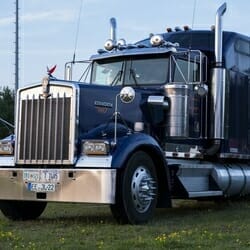
Big Risks for Big Rigs: Why Are Fatal Large Truck Crashes Increasing?
- August 20
- EVANS / DESHAZO / REILLEY
- Personal Injury Truck Accidents
Every day, tractor-trailers share the roads with cars, pickups, and SUVs. But what some tractor-trailers don’t share is the advanced safety technology that helps the passenger vehicles stay accident-free.
According to Consumer Reports, research shows that safety features currently available in passenger cars, such as a forward collision warning (FCW) and automatic emergency braking (AEB), are reducing crashes as they become more available.
Now, experts are wondering if those features could help curb a disturbing trend: the increase in deaths in crashes involving large trucks.
According to the National Highway Traffic Safety Administration, 37,461 people died on the road in 2016, the last year for which statistics are available – an increase of 5.6 percent from 2015. Of those fatalities, more than 4,300 occurred in accidents involving large trucks in 2016, up 5.4 percent from the year before. In crashes involving large trucks, most of the fatalities – 72% in 2016 – were occupants of vehicles other than the large trucks.
While the causes of large truck crashes vary, and truckers aren’t always responsible for accidents, equipping tractor-trailers would have a significant impact on the safety of all motorists. The Insurance Institute for Highway Safety suggests that new safety features could prevent or severely reduce the severity of 107,000 crashes each year – 28% of which involve large trucks.
Some of these measures include:
- Forward collision warning (FCW): Uses radar to detect objects in front of the vehicle, calculate the distance, and trigger an alarm if there is a risk of collision.
- Automatic emergency braking (AEB): Detects an imminent crash, alerts the driver to the danger, and augments the driver’s braking if needed.
- Blind spot warning (BSW): Creates an audible or visual signal when a car is in a vehicle’s blind spot. May create a further warning if the driver activates his turn signal when another vehicle is in the blind spot.
- Lane departure warning (LDW): Creates a signal when the vehicle is about to drift out of its lane, unless the turn signal is on.
- Electronic stability control (ESC): Automatically applies the brakes to individual tires to compensate for skidding, to help the driver maintain control of the vehicle.
New trucks have been required to have ESC since 2017, and all trucks made after 1997 are required to have antilock brakes (ABS). Many tractor-trailer operators and fleets are adding the newer safety systems, but the American Trucking Associations told Consumer Reports it does not support a government mandate to update the technology in trucks, stressing that companies should make those decisions for their own fleets.
If you have been involved in a traffic accident – with a commercial truck or any other vehicle – consider meeting with a qualified Austin truck accident lawyer to make sure you receive the compensation you deserve. In Austin, TX, the Evans Law Firm has years of experience representing personal injury victims, including victims of truck accidents. Call today or fill out our online contact form to schedule your free case consultation.

 Serving Clients Throughout Texas
Serving Clients Throughout Texas
 Chip Evans is a partner at Evans & Herlihy. Chip brings to the firm more than 20 years of experience as a trial lawyer representing Plaintiffs. It is the desire to help individuals, not corporations, that attracts Chip to this side of the docket. [
Chip Evans is a partner at Evans & Herlihy. Chip brings to the firm more than 20 years of experience as a trial lawyer representing Plaintiffs. It is the desire to help individuals, not corporations, that attracts Chip to this side of the docket. [